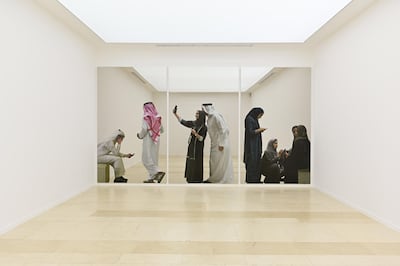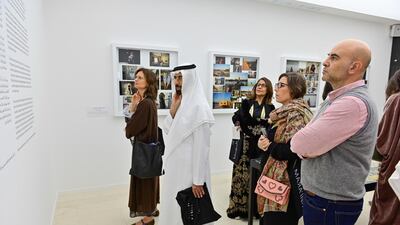Ithra, the Saudi Aramco-sponsored centre for world culture in the kingdom's Eastern Province, has opened a new contemporary art show on photography in the Middle East, featuring artists such as Hazem Harb, Tasneem Al Sultan and Sultan bin Fahad.
The show includes several new commissions that will go into the Ithra Art Collection. Other works came from Institut du Monde Arabe in Paris.
It is one of the first contemporary art shows at the Ithra centre. Curator Candida Pestana explains that one of the reasons Ithra chose to do a photography exhibition was that the Saudi public was not yet familiar with contemporary art, with photography providing a good entry point.
Titled Our Mirrors, the show takes place within a series of small rooms built for the exhibition within the vast Ithra centre. They reflect the role of photography as a mirror on society, as well as the importance of domestic space as an intimate, private sphere in the Arab world.
The works include documentaries, such as images of Arab communities in Paris taken by Moroccan artist Hicham Benohoud, and performative works such as Hrair Sarkissian's video of the destruction of his native Syria.
But the standout work is by Akram Zaatari, whose video investigates the idea of the performance of self that people enact for social media. When you are dancing for the camera, or faux-casually laughing at a joke while a friend Snapchats you, is that genuine engagement, or simply performance? To explore this question, Zaatari recorded an actor praying, first on a prayer mat at the artist's home in Lebanon, and then on a mat in an empty theatre – on both occasions with the man's two young sons climbing on top of him. It is a view into an activity that is mostly kept private and Zaatari's subject is indeed only acting out the prayer. In small discrepancies, his actions move away from the prescribed routine: the timing is off and he bends forward more often than he should.

It is a remarkable piece, showing simply how internal feelings are only barely noticeable in outside actions and it is also remarkable that it should be shown in Saudi Arabia, where social and cultural restrictions are being lifted at a rapid pace. "We are a partner in an expanding field," Ithra's director Fatima Al-Rashed says. "Ithra is a mindset that is shaping how future generations will grow."


